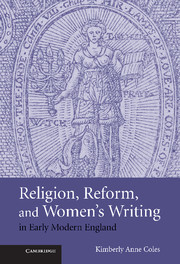Book contents
- Frontmatter
- Contents
- Acknowledgments
- Abbreviations
- Introduction: Making sects: women as reformers, writers, and subjects in Reformation England
- 1 The death of the author (and the appropriation of her text): the case of Anne Askew's Examinations
- 2 Representing the faith of a nation: transitional spirituality in the works of Katherine Parr
- 3 ‘[A] pen to paynt’: Mary Sidney Herbert and the problems of a Protestant poetics
- 4 A new jerusalem: Anne Lok's ‘Meditation’ and the lyric voice
- 5 ‘A Womans writing of diuinest things’: Aemilia Lanyer's passion for a professional poetic vocation
- Afterword
- Notes
- Index
1 - The death of the author (and the appropriation of her text): the case of Anne Askew's Examinations
Published online by Cambridge University Press: 06 July 2010
- Frontmatter
- Contents
- Acknowledgments
- Abbreviations
- Introduction: Making sects: women as reformers, writers, and subjects in Reformation England
- 1 The death of the author (and the appropriation of her text): the case of Anne Askew's Examinations
- 2 Representing the faith of a nation: transitional spirituality in the works of Katherine Parr
- 3 ‘[A] pen to paynt’: Mary Sidney Herbert and the problems of a Protestant poetics
- 4 A new jerusalem: Anne Lok's ‘Meditation’ and the lyric voice
- 5 ‘A Womans writing of diuinest things’: Aemilia Lanyer's passion for a professional poetic vocation
- Afterword
- Notes
- Index
Summary
this is a personal matter,
a private affair and God knows
none of your business.
Anne Sexton, ‘Jesus dies’In considering the theatrical nature of public executions in the early modern period, and the available spectacle of power for both the disciplinarians and the punished, Catherine Belsey has observed that these occasions afforded women ‘the supreme moment to speak’. But perhaps, in spite of the Foucauldian emphasis upon the scaffold, the moment came before. It was during interrogation that the statements of the condemned were most likely to be recorded – and transcriptions of these examinations (either produced by the state or the individual) were frequently published. Of course, execution prevented their having any subsequent control over the production of their words. This fact held special problems for the narratives of women, as the editors who generated the printed forms of their accounts were inevitably men.
The complications of such a textual encounter are graphically displayed in the edited versions of Anne Askew's Examinations. Askew's account of resisting religious authority participates in an emergent reformist discourse – one in which the available precedents were male-authored. While she worked from these models, her perspective was, obviously, unique. But her editors were used to revising the polemical, scholastically informed, accounts of men; neither understood the female-inflected argument. This fact produces an odd distortion of Askew's text in its various material forms. Askew's Examinations were printed in Wesel in 1546 and 1547.
- Type
- Chapter
- Information
- Publisher: Cambridge University PressPrint publication year: 2008



